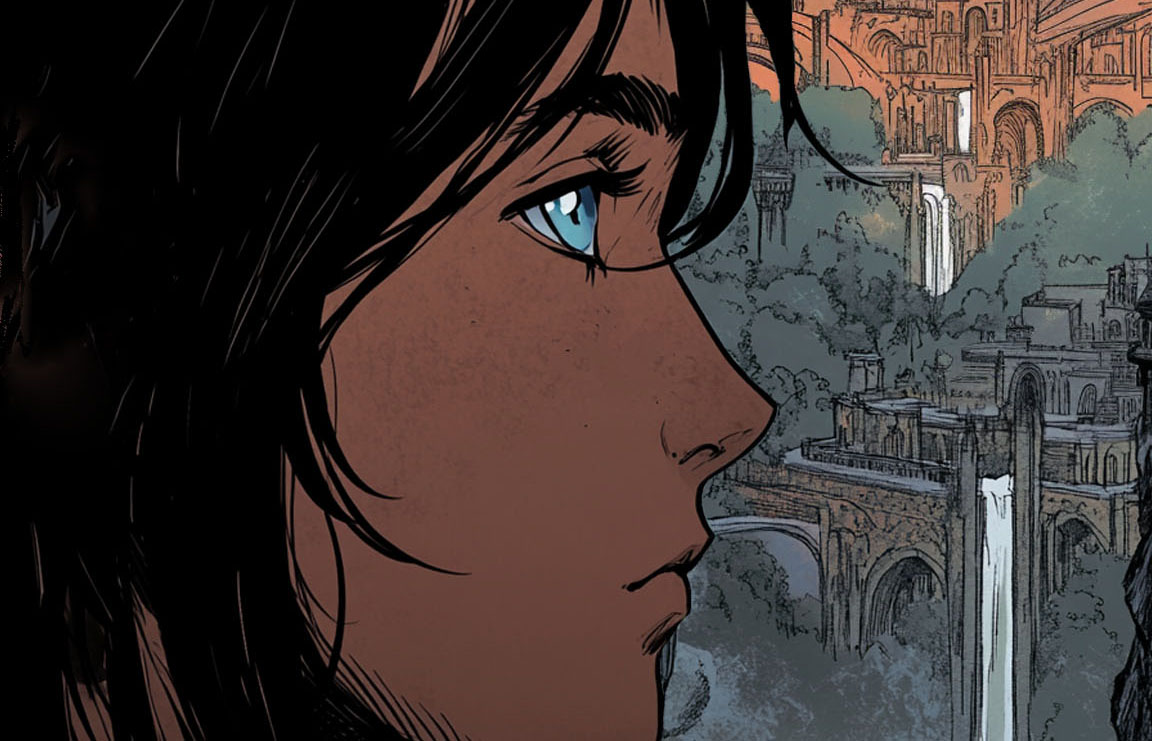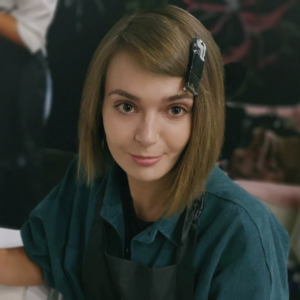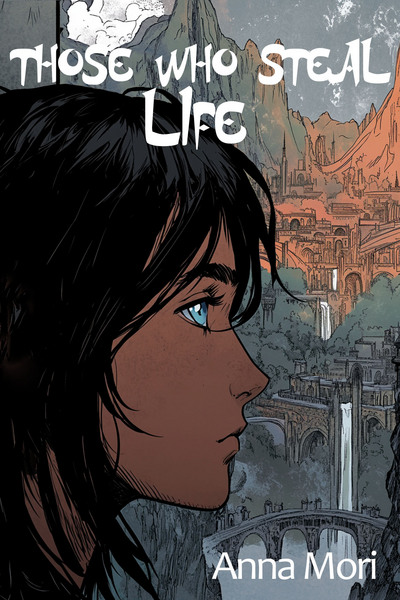Gelareh had released Laleh from her embrace, but Narseh caught the way they exchanged a last, tender glance, how their hands brushed in passing. He sympathized with Kiyanoush’s sorrow at losing love — but despite himself, he smiled. How well he knew that feeling — the urge to touch, to meet another’s gaze, to reassure oneself that love was both given and received.
“And what are your plans, kitten?” Gelareh asked.
“Oh, just wandering about, seeing what else has changed in the settlement. I’ve already stopped by home — and by my— well, my former infirmary. There’s always something new appearing there, though I suppose you’re well aware of that… Ardashir is quite busy at the moment, so really, I just wanted to see you all.”
“In that case, why not have a family dinner tonight? All of us together?”
Kiyanoush and Laleh, still watching each other with a touch of tension, both nodded.
In the mind-weave, Narseh sent Gelareh something more personal:
“You look truly happy.”
“Oh, after these years when I was nearly deprived of creation, I’ve gathered so many ideas — how could I not be happy, finally bringing them to life?”
“I understand your frustration,” Narseh smiled, “but those years did Aryan good.”
“I wasn’t only speaking of Aryan,” she replied, nodding towards Kaveh with a teasing glint in her eye. “But also about this little wellspring of trouble!”
“Well,” Narseh replied, “I wasn’t only speaking of your work — your happiness clearly has more than one cause…”
“Mama, can we invite Anahita to dinner?” Kaveh asked aloud.
Gelareh hesitated just a fraction before answering.
“Let’s save that for another time. Laleh and Narseh don’t know her well, and she might feel uncomfortable among new people.”
To Gelareh, the girl seemed just as unsettling as she did to Narseh. In her slightly unguarded thoughts, he glimpsed a fleeting shadow of unease — and a strange phrase: Strangers will enter as kin. What could it mean? It did not quite resemble a prophecy from one of the Thread Weavers — those were often cryptic, yet their wording rarely left room for interpretation.
The evening sun cast its glow upon the smooth curves of the grotto. The lamps were already burning, and the scent of spiced stewed meat and hot flatbreads mingled with the warmth of sunlit rock, wood, fabric, leather, and the faint aroma of Kiyanoush’s herbs.
Gelareh poured a thick, steaming berry drink into clay cups. Once, it would likely have been Kiyanoush performing this task — he had always been more inclined than she toward cooking and tending the home… Unspoken, yet felt by all, the shifting of roles, the quiet reshaping of bonds. Kiyanoush was no longer quite a resident of this grotto, though neither was he a guest. And Laleh — Gelareh was in love, unmistakably, like a cat in the throes of devotion, but would Laleh ever truly belong here? That remained to be seen.
Kaveh — one of the household’s rightful owners, despite being not yet seven — took his share of responsibilities without protest, slicing and arranging the very flatbreads he had baked himself (albeit somewhat clumsily). He had yet to master the art of concealing his thoughts, and at present, they revolved around the grand adventure that awaited him when, inevitably, his mother and father parted ways for good. Father would return to his ancestral Crane clan and, of course, take Kaveh with him. How envious everyone would be when they learned that he would not just have two homes, but two entire clans! (Alas, his fantasies were unfounded — Kiyanoush had spent nearly all his life in Eranshahr and had no intention of leaving.)
At the same time, the boy was eyeing Laleh from beneath his brows, as if trying to decide whether she was someone to be feared. She, however, paid him no mind, engaged in conversation with Kiyanoush about the magic of Unraveling.
“So you mean to say that dreams can be broken down into elements, like the pattern of a woven fabric?” Kiyanoush traced the rim of his cup with a thoughtful finger.
“I don’t know about dreams themselves,” Laleh admitted, “but your perceptions of herbs and their effects — those can certainly be analyzed. If, of course, I observe your work.”
“So… while an herbalist relies on intuition, experience, and tradition, an Unraveling mage could calculate the effects of plants of power as precisely as a science?” Narseh interjected.
“Something like that.”
Kiyanoush ran his fingers over his chin, mulling it over.
“Fascinating. If you could truly translate the effects of my herbs into magical formulas, it might be possible to mix and alternate them in ways that nature itself would never allow…”
At that moment, Kaveh spoke up:
“Laleh, do you know how to lure a night owl so it can be tamed?”
“Of course I do,” she replied with a smirk. “But I won’t tell you.”
“Why not?!”
“Because you’re testing me.”
Kaveh scowled, then suddenly broke into a sly grin.
“What if I say that I know a way myself?”
Laleh gave a short laugh. “Oh? Let’s hear it, then.”
“Yes! You have to whisper the owl’s name three times…”
“And have you tried it? Let’s test your theory.”
“No!” The boy tensed at once. “If someone sees, it won’t work!”
Scowling at Laleh, he curled up on the cushions beside his father.
Kiyanoush turned to him.
“And have you chosen a name for your owl yet? It isn’t Athena, is it?”
Ardashir was the boy’s hero — no surprise, then, that Kaveh wanted an owl just like his.
“No, mine is different. Mine is even cooler.” Kaveh leaned forward conspiratorially. “She… she can blend into the shadows. And she knows human speech! She’s incredibly smart — so smart that when I summon her, no one will see her! And if someone wicked dares step into our home, she will transform into a fiery bird and drive them away. Just like that!”
“And what does she eat?” Narseh asked with amusement.
“Nuts with honey. And cheese with jam,” Kaveh replied without the slightest hesitation.
Gelareh laughed.
“Well now! A far tidier pet than Ardashir’s owl. Will you introduce me to her sometime?”
Kaveh nodded proudly, pleased that his tale had been taken in earnest.
Kiyanoush turned back to Laleh, resuming their interrupted discussion.
“So then — if you truly could translate the properties of herbs into magical formulas… the possibilities would be endless! If one were to introduce an unexpected element into a dream — something as simple as a sharp sound — it could break the entire structure. Or, with the right rhythm, a nightmare might be stabilized, preventing uncontrollable fits of terror…”
“Yes! And not just that!” Laleh’s dark eyes gleamed with excitement. “For greater precision, of course—” her voice quickened, fervent now, “for greater precision, we would have to break down the structure of the dream itself…”
“But dreams are not magical constructs,” Kiyanoush countered. “Are you suggesting that emotions can be reduced to formulas?”
Though they debated, the tension between them had long since eased.
“In a way, yes.” Laleh shrugged. “Everything in this world is a structure—magical or otherwise. Dreams won’t become numbers, of course, but they might be mapped through patterns. Fear, for instance, is something closed — a circle, impossible to escape. And hope? A rising spiral. If we understand this, we could shape healing visions at will. But we, Unraveling mages, are merely… translators, so to speak. What’s needed is someone who speaks the language itself.”
“The language of dreams?” Kiyanoush shook his head. “I’ve heard stories of those who could walk within dreams, guide them, shape them — dreamwalkers and dreamweavers — but those are merely legends…”
Narseh listened, absentmindedly tapping his finger against the rim of his cup. The conversation was fascinating, yet one thought kept circling in his mind: Strangers will enter as kin…
He decided to test Gelareh’s reaction once more.
“Kaveh, are you bored listening to all this talk of work? It would be livelier with Anahita here, wouldn’t it?” he said casually.
The boy squinted, considering.
“Well… no, it’s not so bad. It’s actually kind of interesting…”
Gelareh’s mind remained open, warm, welcoming. But now, Narseh found no trace of a thought about Anahita. She had always been adept at concealing stray thoughts in mainyu, no worse than Ardashir himself — and after years of governing a nation, she had only grown more skilled.
But Kiyanoush, at the mention of Anahita’s name, hesitated. And that was enough.
When Narseh had glimpsed the words — Strangers will enter as kin — he had not recognized the voice that spoke them. Gelareh’s memory had preserved only the feeling they left behind: a vague, uneasy foreboding.
Anahita had never, in Narseh’s memory, spoken to anyone but other children — and even then, only within mainyu…
So whose words were they?
Now he knew.
They had been Ardashir’s.
In Kiyanoush’s recollection, he had spoken different words:
"They drink eternity from a chalice filled with blood, but their vessel is cracked, and from the fissures, demons shall emerge."
A chill traced down Narseh’s spine.
“And what is that even supposed to mean?” Kiyanoush had asked in the memory Narseh was now reading. “How can you not know? You’re the one who wrote it down!”
“When I speak with her, I feel as though I understand… more or less,” Ardashir had replied. “But when our minds part, only this remains — like a scrap of song carried to you by the wind. You, of all people, should know what the Other Side is… something too vast to fit within the confines of a human mind.”
“Say those other words again. Maybe if I write them down, something will come to me.”
"He who rules forever will not break, for he knows neither pain nor joy. His heart is an empty chamber."
“I’d think that speaks of the Red Emperor… But he is long dead. And the third one?”
"When kin become strangers, when strangers enter as kin, then know this — the dawn has not yet come, but the night has already passed."
“And you believe these… prophecies should be taken as a call to action? If that were the case, wouldn’t Anahita have told everyone, rather than simply letting you glimpse them in her mind?”
“I am not certain.”
“Don’t you think that… no matter what great fate awaits her, for now, she is just a child? Maybe you torment her needlessly. Maybe these really are only fragments of a song that has nothing to do with us.”
Kiyanoush caught Narseh’s glance. The thoughts of Anahita closed like water turning to ice in an instant. Narseh saw nothing more.
With the same precision, he buried his own surge of anger, ensuring it would not disturb the warmth of the evening.
Why had Ardashir not told him of this?! "There are times when people retreat into themselves — into their work, into their thoughts..." Sure! Damned liar! Narseh had spent all his days either brooding or dreaming of reviving his homeland — and Ardashir, as always, had decided he could handle it alone?
But this — this was important. Too important for silence.
Well, at their next meeting, Narseh would have words for him. That much was certain.
To distract Kiyanoush, Narseh steered the conversation back to dreams.
“As for the idea that everything in the world is a construct… The Daoists teach something similar — that all things, whether magic or not, whether tree or human flesh, are but different expressions of the same energy. They call this force qi.”
“Isn’t that the same life-current you channel when you heal people?”
“Qi includes it — and yet, it isn’t the same. I don’t know how to explain… To work with qi, my mind must enter a particular state. I have seen Laoshi Wenlin mend grievous wounds without even touching her patient. It reminds me of Unraveling — she perceives everything as a kind of structure, much as Laleh described… But the Daoists do not think in formulas. They simply guide the energy through will and technique.”
“And can you do the same?”
“A little… But I know I am not ready.”
“If qi runs through all things and not just human bodies,” Gelareh mused, “then your skills must extend beyond healing, do they not?”
“Well… I know a few tricks. Silly ones, mostly.”
“You’ll show us someday?”
“Perhaps,” Narseh admitted with a sheepish smile. “But what I meant to say was — about the dreamwalkers! Yes, among the Arya, there have been none for a long time. But in other lands, they still exist. I have heard of a few such mages… though healing is not their craft.”
“And what are the odds that one of them would wish to come here and lend us aid?” Kiyanoush said, skeptical.
“If they exist, then rather than waiting, we could seek them out ourselves,” Laleh countered.
The conversation drifted naturally into more practical matters: which plants of power could bring sudden insight, which eased sleeplessness, which soothed anxious hearts. Laleh took out paper and began sketching notes.
Watching them, Narseh realized that his unease had faded. The evening embodied all the things he loved: discussions of science and healing, the beauty of nature and human ingenuity, family — for despite the initial tension, the dinner had become truly warm.
If only Ardashir and Lyn were here as well…
It was everything he had ever yearned for.
And yet… not.
Some contradiction lay within him, something that had been growing for years — perhaps since he first became Laoshi Wenlin’s student. Or even before that. But like earlier that day, when he had wandered through the empty grotto he shared with Lyn and Ardashir, brushing dust from forgotten things and wondering what had truly driven him to leave for the land of Chin…
The thoughts were too complex — or too painful — to shape into words. Not even for himself.
“What if we play Shadowcatcher?” he suggested, looking at Kaveh.
Gelareh nodded.
“A fine idea. We have candles — we could play right here.”
“Yes!” The boy brightened. “But I want to be the Shadow!”
“Then we shall all be the Hunters,” Kiyanoush said with a smile, “and our task will be to catch you before your shadow slips away.”
They dimmed the lamps and lit only a few candles, placing them around the room. Kaveh darted nimbly between the pools of light, making sure his shadow never fell into the Hunters’ grasp. Narseh, Kiyanoush, and Laleh laughed as they tried to predict his movements. Gelareh aided her son, crafting pockets of darkness to shield him.
Narseh was barely thinking of prophecies anymore.
That Ardashir had concealed something from him yet again — yes, that still stung. And that Lyn, at times, seemed not to understand him at all — that stung as well.
But the warmth of the evening held him, soft as a cat’s paw resting against his heart.
"The dawn has not yet come, but the night has already passed."
In the end, it did not sound so grim.
Perhaps it was not meant as a warning at all.
Was it?












Comments (0)
See all